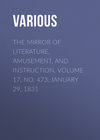Читать книгу: «The Mirror of Literature, Amusement, and Instruction. Volume 17, No. 473, January 29, 1831», страница 6
SPIRIT OF THE PUBLIC JOURNALS
MUSICAL LITERATURE IN NORTH AMERICA
We have just received two numbers of a New York periodical, entitled the "Euterpeiad, a Musical Review and Tablet of the Fine Arts," published every fortnight, or, as our transatlantic fellow-labourers express it, "semi-monthly," and feel flattered at finding our opinions quoted, our columns referred to with acknowledgment, and, still more, our custom of giving good and cheap music, followed, though on a smaller scale, by this critic of the new world. One of the two numbers before us contains Paisiello's delightful serenade from the Barber of Seville, as arranged by Bishop for two voices; and the other, a movement from Rossini's overture to William Tell; both very creditable, as well to the selector's taste as to the progress of American musical typography. The "Euterpeiad" is not confined to music, but embraces the whole circle of the fine arts, theatrical criticism, and even original tales. We are concerned, however, only with the musical part, and, as a specimen of the manner in which it is probable that department will be conducted, give the following extract from the editor's address:
"In regard to music, since the appearance of Weber, an almost new era has commenced. In the works of this celebrated composer, the proverb has been realized—the German Professor has given to his notes the power of language: emotions are almost imbibed from the sounds as from a visible transaction, or a well-told description. If the country which presents the highest or most generally approved attainments in singing, be demanded, perhaps the correct answer would be Italy. The contest afterwards for the highest eminence would lie between England, Germany, and France. The Scottish, Irish, and Welsh compositions, and English ballad music, must of course come under the aggregation of the English school, and availing itself of this union, and taking into view the circumstance of having for a considerable period steadily adopted, and engrafted upon its own stock, the beauty and excellence in the science manifested by the Germans and Italians, the claims of this school become formidable. And it is this which, through the medium of the same tongue, extends an immediate and irresistible influence over the United States.
"As this school is so interesting to the American public, we shall go into some particulars respecting it. To avoid tediousness, the eminent compositions of the English school may be reduced to two classes—lyrical and sacred; or, as some would divide it, into three, adding madrigalists. We can go back for the second class, as far as the time of Henry VIII. who was himself no mean composer in church music. Purcell, the well-known composer of the music for the Tempest, has stood the ordeal of nearly three centuries. He was also the author of the music of the Indian Queen, Arthur and Emmeline, and a variety of other pieces. It may be observed that these names are not clustering, but solitary, appearing at long intervals. Locke, the producer of the music in the incantation scene in Macbeth, as now sung and played, was the contemporary of Purcell. Dr. Arne next appears, the famous composer of Artaxerxes. Bishop, who has identified himself with almost every thing valuable in modern composition, is well known, as are also his works. It would be impossible to omit the name of Handel, the great thorough bass of musical composition, to whom Mozart confessed that every subsequent composer had been signally indebted. He is, by adoption and patronage, the property of the English school. It may not be unacceptable to add, that he composed, besides his other numerous works, one hundred and fifty-eight pieces, of which thirteen were Italian operas, many of which were successful.11 The famous contest between Handel and Buononcini in Italian composition was decided in favour of the former by public acclamation. Those who are sceptical on the score of his composing in Italian, are referred to the well-known air, 'Lord, remember David,' which is to be found in the opera of Sosarmes, commencing with the words, 'Rendi il sereno.'"12
The list of operas recently performed in New York might put our patent theatres a little to the blush, at least on the score of variety. Rokeby; the Tempest; John of Paris; the Barber of Seville; the Caliph of Bagdad, performed, and the Freischütz in preparation, at one theatre. The principal female singers are all English—Mrs. Austin, Mrs. Knight (formerly Miss Povey), and Madame Feron. The American editor's remarks on the two last named ladies, and on ballad singing in general, are so much in accordance with our own opinions, except the praise he bestows on Madame Feron's execution, that we cannot resist the temptation of extracting them.
"Mrs. Knight's worst ballads, aided by a drum beaten by Mr. Knight, seem to please the audience better than Mad. Feron's bravuras; indeed, we think the manager would gain more by the adoption of Mrs. K. than Madame F. We have remarked a listlessness on the part of Madame F., doubtlessly in consequence of feeling that her best efforts are not appreciated by the audience. We are not an ardent admirer of that lady's style: she has evidently studied to surmount difficulties, without sufficiently paying attention to the groundwork of singing; she fills you with admiration at the execution of a tremendous passage, and then disappoints you by singing a few sustained notes in a tremulous, uncertain manner. In making the above observations on ballads, let us not be supposed to throw discredit upon that style of composition. 'Robin Gray,' 'Oh no we never mention her,' 'The Soldier's Tear,' and such compositions, are a description of ballads, of which, with the Irish, Scotch, and Welsh melodies, we are proud; but if we admit that the drum and fife compositions of Mr. Lee and others, such as 'Bonnets of blue,' 'Blue bonnets,' 'Charley's over the water,' and 'Over the water to Charley,' are other than trash, fit only to amuse the gentlemen and ladies of colour in the gallery, we should be unworthy to be editor of the 'Euterpeiad.'"
Harmonicon.—No. 1.
HENRY MACKENZIE, ESQ
We regret to announce the death of this eminent literary character, and venerable citizen, so well known as the author of The Man of Feeling, and many other productions. Mr. Mackenzie had been confined almost to his room for a considerable time past by the general decay attending old age, and expired, we understand, on the evening of Friday the 14th. There will no doubt in time come from his friends a biographical account of so distinguished and excellent a man; and although it might not be proper to enter into detail at present, we cannot but with feelings of regret notice the departure of almost the last of that eminent class of literary men, who, above fifty years ago, cast such a lustre on our city. They were succeeded, indeed, by a more stern, and probably more philosophical class of writers, as displayed in the papers of the Edinburgh Review, and similar productions; but in that delicate perception of human character and human manners, so correctly, so elegantly, and often so humourously delineated in the numbers of the Mirror and Lounger, where Mr. Mackenzie was the chief contributor, as well as in his other works, and in his general views of the great principles of moral conduct, there have been few authors more distinguished. The elegant society in Edinburgh, well known in former days by the name of the "Mirror Club," consisted, besides Mr. Mackenzie, of several gentlemen who were afterwards Judges in the Court of Session—viz. Lord Bannatyne, Lord Cullen, Lord Abercrombie, Lord Craig, and also Mr. George Home and Mr. George Ogilvie. The first, now Sir William Bannatyne, a venerable and most accomplished gentleman of the old school, is the only survivor. Mr. Mackenzie was in his 86th year, having been born in 1745. His eldest son is Lord Mackenzie, at present an eminent Judge in the Courts of Session and Justiciary.
–Edinburgh Evening Courant.
THE GATHERER
A snapper up of unconsidered trifles.
SHAKSPEARE.
ARCH POETRY
Pope Leo X. was particularly fond of Querno, a poet, the author of "The Alexiad," and who, at an entertainment given by some young men of rank, had been dignified with the appellation of "The Arch Poet." Leo used occasionally to send him some dishes from his table; and he was expected to pay for each dish with a Latin distich. One day, as he was attending Leo at dinner, and was ill of the gout, he made this line:
Archi-poeta facit versus pro mille poetis:
What pains for others the arch poet takes,
He for a thousand poets verses makes.
As Querno hesitated for the next line, the good-humoured Pontiff replied—
Et pro mille aliis Archi-poeta bibit:
If for a thousand he's obliged to think,
He chooses for as many more to drink.
Querno, willing to make up for his former deficiency, exclaimed—
Porrige, quod facient mihi carmina docta Falernum:
To aid my genius, and my wit refine,
Most Holy Pontiff, pour Falernian wine.
The Pope immediately replied—
Hoc vinum enervat debilitatque pedes:
I shall supply that wine with sparing hand,
Which from the feet takes off the power to stand.
J.G.B.





















